Relationship Spread #2
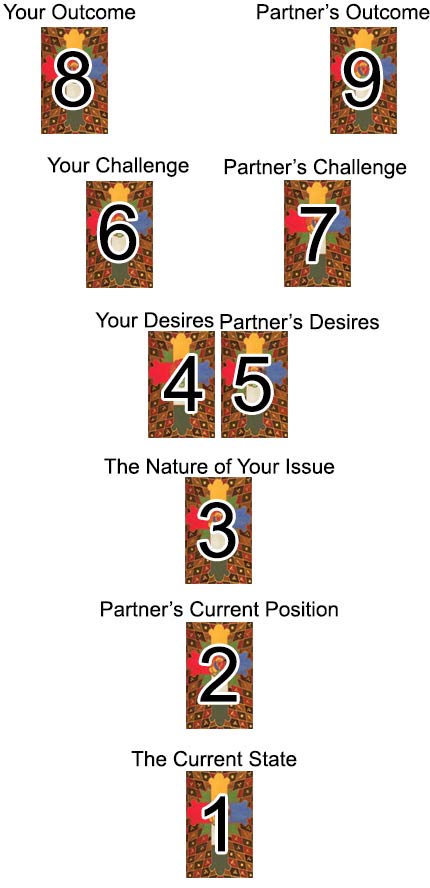
Card Positions
- Your current state of mind
- Partner's position
- The nature of your issue
- Your desires
- Your partner's desires
- Your challenge
- Your partner's challenge
- Your outcome
- Your partner's outcome
Your Relationship #2 Reading
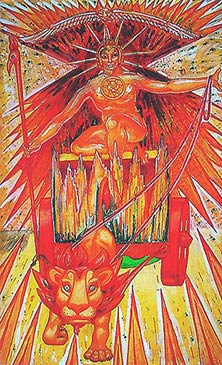 Prince of Wands |
|
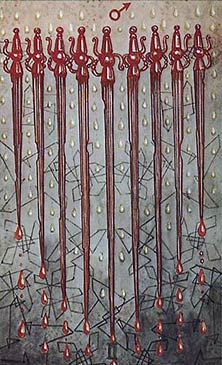 9 of Swords |
|
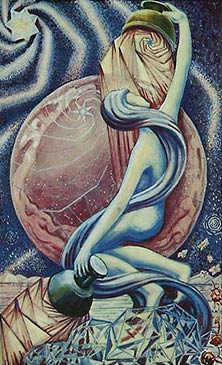 The Star |
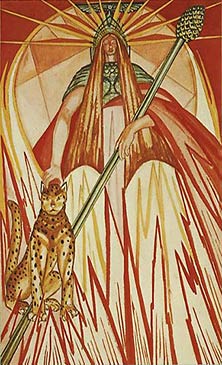 Queen of Wands |
||
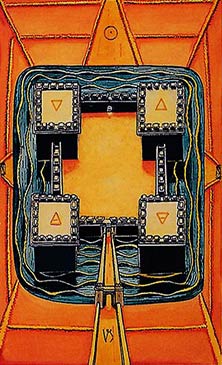 4 of Disks |
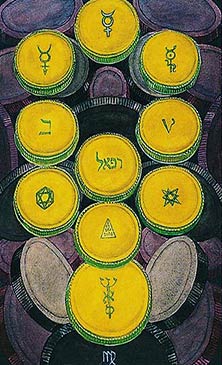 10 of Disks |
||
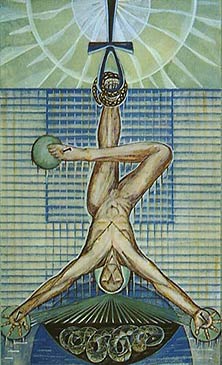 The Hanged Man |
|||
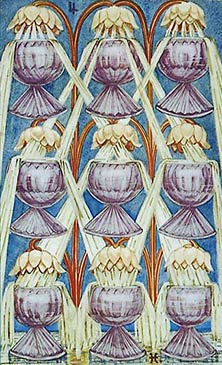 9 of Cups |
|||
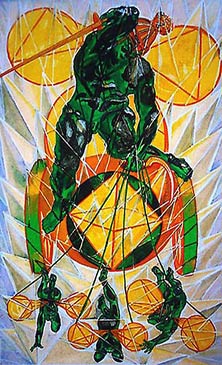 Prince of Swords |
|||

Prince of Swords
Aquarius
This card represents the airy part of Air. This chariot is drawn by winged children, looking and leaping irresponsibly in any direction that takes their fancy; they are not reined, but perfectly Capricious. The chariot consequently is easy enough to move, but quite unable to progress in any definite direction except by accident. This is a perfect picture of the Mind.
The operation of his logical mental processes have reduced the Air, which is his element, to many diverse geometrical patterns, but in these there is no real plan; they are demonstrations of the powers of the Mind without definite purpose. In his right hand is a lifted sword wherewith to create, but in his left hand a sickle, so that what he creates he instantly destroys. A person thus symbolized is purely intellectual. He is full of ideas and designs which tumble over each other. He is a mass of fine ideals unrelated to practical effort. He has all the apparatus of Thought in the highest degree, intensely clever, admirably rational, but unstable of purpose, and in reality indifferent even to his own ideas, as knowing that any one of them is just as good as any other. He reduces everything to unreality by removing its substance and transmuting it to an ideal world of ratiocination which is purely formal and out of relation to any facts, even those upon which it is based.

9 of Cups
Jupiter in Pisces - Happiness
The Number Nine, Yesod, in the suit of Water, restores the stability lost by the excursions of Netzach and Hod from the Middle Pillar. It is also the number of the Moon, thus strengthening the idea of Water.
In this card is the pageant of the culmination and perfection of the original force of Water. In the symbol are nine cups perfectly arranged in a square; all are filled and overflowing with Water. It is the most complete and most beneficient aspect of the force of Water.

The Hanged Man
Water
Enforced sacrifice, punishment, loss, fatal or voluntary, suffering, defeat, failure, death.

4 of Disks
Sun in Capricorn - Power
The Four, Chesed, shows the establishment of the Universe in three dimensions, that is, below the Abyss. The generating idea is exhibited in its full material sense. The card is ruled by the Sun in Capricornus, the Sign in which he is reborn. The disks are very large and solid; the suggestion of the card is that of a fortress. This represents Law and Order, maintained by constant authority and vigilance. The disks themselves are square; revolution is very opposite to the card; and they contain the signs of the Four Ele ments. For all that, they revolve; defence is valid only when violently active.
So far as it appears stationary, it is the "dead centre" of the engineer; and Capricornus is the point at which the Sun "turns again Northward". The background is of deep azure, flecked yellow, suggesting a moat; but beyond this is a pattern of green and indigo to represent the guarded fields whose security is assured by the fortress.

10 of Disks
Mercury in Virgo - Wealth
Mercury rules this card in Virgo; and this may imply that the acquired wealth, being inert, will be dissipated unless put to further use by devoting its power to objects other than mere accumulation. The disks, or (as they have now become) coins, are arranged on the Tree of Life, but the Tenth coin is much larger than the rest; the image indicates the futility of material gain.
These disks are inscribed with various symbols of mercurial character except that the coin in the place of Hod (Mercury) on the Tree is marked with the cipher of the Sun.

The Star
Aquarius
Hope, unexpected help, clearness of vision, realization of possibilities, spiritual insight, with bad aspects, error of judgment, dreaminess, disappointment.

Queen of Wands
Aries
The Queen of Wands represents the watery part of Fire, its fluidity and colour. Also, she rules in the Zodiac from the 21st degree of Pisces to the 20th degree of Aries. Her crown is topped with the winged globe and rayed with flame. She is seated upon a throne of flame, ordered into geometrical light by her material power. Beneath the throne the surging flames are steady. She bears a~wand in her left hand; but it is topped with a cone suggestive of the mysteries of Bacchus. She is attended by a couchant leopard upon whose head she lays her hand. Her face expresses the ecstasy of one whose mind is well in-drawn to the mystery borne beneath her bosom.
The characteristics of the Queen are adaptability, persistent energy, calm authority which she knows how to use to enhance her attractiveness. She is kindly and generous, but impatient of opposi tion. She has immense capacity for friendship and for love, but always on her own initiative.

Prince of Wands
Leo
The moral qualities appropriate to this figure are swiftness and strength. But he is sometimes inclined to act on impulse; sometimes easily led by external influences; sometimes, especially in trifles, a prey to indecision. He is often violent, especially in the expression of an opinion, but he does not necessarily hold the opinion about which he is so emphatic. He states a vigorous proposition for the sake of stating it. He is in fact very slow to make up his mind thoroughly on any subject, but always sees both sides of every question. He is essentially just, but always feels that justice is not to be attained in the intellectual world. His character is intensely noble and generous.
He may be an extravagant boaster, while slyly laughing both at the object of his boast and at himself for making it.
One of his greatest faults is pride; meanness and pettiness of any kind he holds in infinite scorn. His courage is fanatically strong, and his endurance indefatigable. He is always fighting against odds, and always wins in the long - the very long-run. This is principally due to his enormous capacity for work, which he exercises for its own sake, "without lust of result".

9 of Swords
Mars in Gemini - Cruelty
Consciousness has fallen into a realm unenlightened by reason. This is the world of the unconscious primitive instincts, of the psychopath, of the fanatic. The celestial ruler is Mars in Gemini, crude rage of hunger operating without restraint; although its form is intellectual, it is the temper of the inquisitor.
The symbol shows nine swords of varying lengths, all striking downwards to a point. They are jagged and rusty. Poison and blood drip from their blades. There is, however, a way of dealing with this card: the way of passive resistance, resignation, the acceptance of martyrdom. Nor is an alien formula that of implacable revenge.

